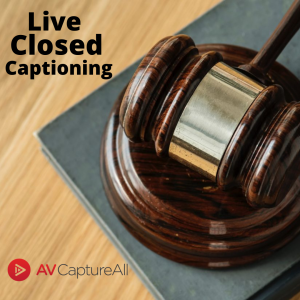Full and equal access to the courts is a fundamental right under the U.S. Constitution. To ensure that right, each participant, and observer, in a court proceeding, must be able to effectively understand what is being communicated, to respond, and to be understood when responding. This includes criminal defendants, civil litigants, witnesses, jurors, prospective jurors, lawyers, judges, and spectators, among others. Yet individuals who are deaf or hearing-impaired continue to face communication barriers that deny them an opportunity to participate fully in the judicial process.

The American Bar Association (ABA) has a policy that addresses accessibility of courthouses and court proceedings for persons with disabilities and the United States has several laws covering accessibility requirements for persons with disabilities, including those who are deaf or hearing impairment.
In 2010, President Obama signed the Twenty-First Century Communications and Video Accessibility Act (CVAA). The CVAA updates federal communications law to increase the access of persons with disabilities to modern communications. The CVAA makes sure that accessibility laws enacted in the 1980s and 1990s are brought up to date with 21st-century technologies, including new digital, broadband, and mobile innovations. The following are highlights of the new law.
And there is Title I – Communications Access which requires advanced communications services and products to be accessible by people with disabilities. Advanced communications services are defined as (1) interconnected voice over Internet protocol (VoIP) service; (2) non-interconnected VoIP service; (3) electronic messaging service; and (4) interoperable video conferencing service. This includes, for example, text messaging, e-mail, instant messaging, and video communications.
With technology seemingly in every moment of our lives, we can no longer deny all citizens the access and ability to communicate within the judicial system.
For AV Capture All, providing Live Closed Captioning in our Judicial Solution has been a priority. Our new Live Closed Captioning service enables real-time speech-to-text transcription and captioning for Live Streams delivered by the AV Capture software.
AV Capture All is excited to announce our launch of Live Closed Captioning for court proceedings. The AV Capture Judicial Solution includes a live closed captioning tool that can be integrated into our video functionality, is done in real-time with live transcription and live captioning, with 98% accuracy.
AV Capture’s live closed captioning works seamlessly with our video solution and will easily become part of your agency’s overall transparency and accessibility plan.
Our new services provide enhanced accessibility and a better experience for viewers of your hearings. They also deliver more value from your existing content by appealing to a wider audience.
Closed Captioning for Recorded Media includes:
- Automatic speech-to-text transcription within minutes of Publishing
- Closed Captions displayed in the media player during playback
- Transcript file download available
- Closed Captioning for Live Streaming
- Speech-to-text transcription in real-time
- Closed Captions displayed in the media player during the live stream
- Advanced algorithms provide >98% accuracy in real-time
All of the AV Capture Judicial plans can be easily integrated with any videoconferencing platform to capture in-person, virtual, or hybrid hearings. They also support audio-only or audio/video – your choice.
For more information, contact us for a live demo, click here.

